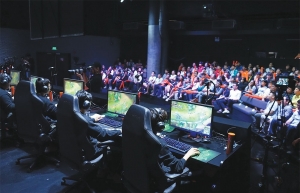Gaming sector fears special tax
The Ministry of Finance is currently collecting feedback from those affected on the proposed amendment to the Law on Special Consumption Tax (SCT), which includes bringing online video games into the subject of excise tax. Businesses in the sector are worried it will lead to adverse effects on their development.
Duong Truong Minh, director of the International Business Centre at Gosu Corporation, said that registered games would be directly affected if online games were added to the SCT.
“The application of the special consumption tax will increase the price of game products, thereby reducing the number of consumers and sales of games,” Minh said.
Furthermore, the SCT will indirectly reduce the demand for legal services in Vietnam and lead consumers closer to using illegal services from abroad.
As the prices of domestic game products increase, players may seek illegal game software or free games to avoid high expenses. This could indirectly encourage customers to use unlicensed games, causing revenue losses for legitimate game manufacturers and publishers.
“Meanwhile, foreign businesses that are not registered and do not pay taxes or comply with Vietnamese laws are not subject to any restrictions,” Minh said.
 |
| There are more than 220 licensed game businesses in Vietnam, but the number of companies that are actually operating and providing games to the market is only about 20 |
According to the Authority of Broadcasting and Electronic Information of the Ministry of Information and Communications (MIC), as of November 2022, there were 248 companies licensed to provide G1 online gaming services in the country, including 54 companies that have ceased operations or had their licenses revoked.
The number of approved electronic games with approved content and scenarios is 1,327, including 856 games currently in circulation and 471 games that have been announced as discontinued.
“There are more than 220 licensed game businesses in Vietnam, but the number of companies that are actually operating and providing games to the market is only about 20. The rest are almost no longer active because they can't compete with foreign businesses," said La Xuan Thang, VNG’s online game publishing manager.
In addition, the gaming industry in Vietnam has low revenue and profits compared to other countries in Southeast Asia. According to Newzoo, in 2022, Indonesia led the region with game industry revenue of $1.8 billion, followed by Thailand at $1.1 billion, Malaysia at $911 million, Vietnam at $782 million, and Singapore at $511 million.
Le Xuan Hoa, vice chairman of the Vietnam Software and IT Services Association, said that game companies in Vietnam were facing a shrinking tendency, as licensed games were losing ground to their pirate or unlicensed counterparts.
“Many Vietnamese game companies have set up and operated successfully in foreign countries, such as Singapore, leading to a drain of resources. The basic reason identified is tax policies and better incentives in Singapore,” Hoa said.
Hoa drew on the example of Vietnam's neighbouring country, saying that game production companies in Singapore do not have to apply for licences to provide electronic game services or approval of content and scenarios for each game product.
In particular, newly established companies in Singapore are exempt from 75 per cent of the tax applied to taxable income of the first SGD100,000 for the first three years, and continue to be exempt from 50 per cent of the tax applied to taxable income of the next SGD100,000.
 |
| The MIC is developing a Strategy for the Development of the Online Gaming Sector for the 2022-2027 period |
In light of difficulties faced by online gaming businesses in Vietnam, the MIC is developing a Strategy for the Development of the Online Gaming Sector for the 2022-2027 period. This includes building policy mechanisms, supplementing legal regulations to simplify administrative procedures, providing incentives for the gaming industry, and attracting companies currently headquartered overseas.
Economist Can Van Luc believes that Vietnam's gaming sector is not yet well-developed in the ASEAN region and has a large inflow of imports from abroad, so the tax revenue from games is not significant. Therefore, policymakers need to evaluate the risks and how to prevent them.
“There should be a thorough assessment of the impact on users and businesses and clear reasons for applying this tax rate,” Luc said.
He recommended that Vietnam should have guidelines to control consumer behaviour and establish a gaming culture to encourage the industry's development.
“There should be solutions to reduce the risks of gambling and their effects on players' health, psychology, and behaviour. Singapore and China have such guidelines, and they are essential for the industry,” he said.
 | Gaming publishers shy away from tax proposition A proposal to impose special consumption taxes on online games in Vietnam has been shot down by businesses and industry experts. |
 | Billion-dollar gaming industry attainable Vietnamese game publishers are striving to rise up the ranks of the global gaming industry by holding on to top talent and encouraging modern thinking from legislators and potential consumers. |
What the stars mean:
★ Poor ★ ★ Promising ★★★ Good ★★★★ Very good ★★★★★ Exceptional
 Tag:
Tag:
Related Contents
Latest News
More News
- Masan Consumer names new deputy CEO to drive foods and beverages growth (February 23, 2026 | 20:52)
- Myriad risks ahead, but ones Vietnam can confront (February 20, 2026 | 15:02)
- Vietnam making the leap into AI and semiconductors (February 20, 2026 | 09:37)
- Funding must be activated for semiconductor success (February 20, 2026 | 09:20)
- Resilience as new benchmark for smarter infrastructure (February 19, 2026 | 20:35)
- A golden time to shine within ASEAN (February 19, 2026 | 20:22)
- Vietnam’s pivotal year for advancing sustainability (February 19, 2026 | 08:44)
- Strengthening the core role of industry and trade (February 19, 2026 | 08:35)
- Future orientations for healthcare improvements (February 19, 2026 | 08:29)
- Infrastructure orientations suitable for a new chapter (February 19, 2026 | 08:15)





















 Mobile Version
Mobile Version